Have you ever wondered about horse riding cruelty? Is there an ethical way to do it? Do vegans dare to ride horses? Spoiler alert. Yes, some vegans ride horses (and that’s okay).
The ethics of horse riding are highly debatable and somewhat controversial. On the one hand, you have die-hard horse fans who invest copious amounts of money and time looking after their beloved pets.
On the other side of the spectrum, you have people who breed, train, and trade horses purely for financial gain — no matter the cost to the horse.
This guide will cover a brief history of horse riding, whether horses feel pain when ridden before assessing the ethical nuances of horseback riding.
Horse domestication: are there any wild horses left?
The word “horse” comes from the Latin Equus or Greek hippos.
They’re large animals with adults weighing between 400 and 1,200kgs.
Horses were hunted for meat before becoming domesticated. The trade-off? Horses got shelter and food, and in exchange, they pulled chariots and provided transportation in war.
Horses have been domesticated for around 6,000 years in the steppe lands north of the Black Sea from Ukraine to Kazakhstan and today are one of the most popular pets in the world.
According to the Food and Agriculture Organisation, there are approximately 60 million horses worldwide with over 300 different breeds.
Unfortunately, there aren’t many wild horses today due to domestication — despite a small number in Central Asia.
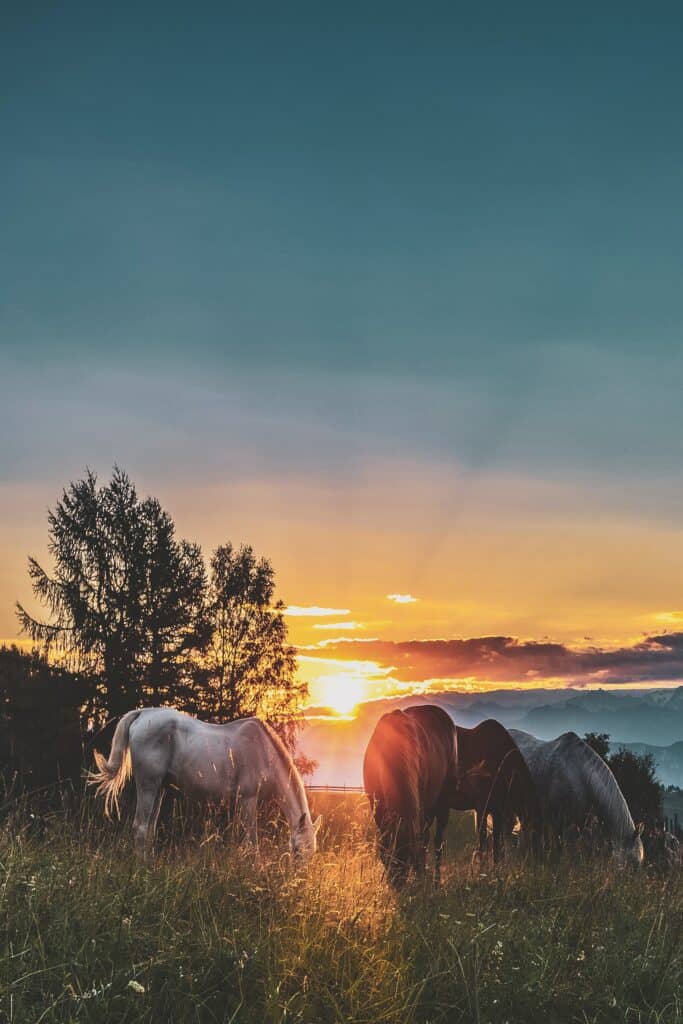
There are, however, around 600,000 feral horses, which are descendants of domesticated horses (that behave like wild horses). Australia has the largest population of feral horses (called Brumby’s), with approximately 400,000 individuals.
Horses are members of the family Equidae, which includes donkeys, zebras, mules, and asses.
The different types of horse riding
I know this sounds overly fundamental. But it’s essential to define horse riding when trying to understand the industry’s cruelty.
Horse riding is where the rider sits on the horse’s back with their legs draped over their body. Riders use reins attached to the horse’s head to control its movement. Riders can also hold onto the saddle horn or pommel to steady themselves.
Humans ride horses for recreation, utility and competitive sports. The most common types of horse riding include:
- Riding lessons: a prevalent activity amongst children who want to learn how to ride horses.
- Horse racing: a sport where jockey’s train and race horses in competition.
- Eventing: a team consisting of one horse and rider competes against others for points in each discipline (dressage, cross country, and show jumping). The sport of horse show jumping has been around since the mid-1800s, and it’s one of the most popular equestrian sports today.
- Trail riding: where horses are ridden on a trail. It’s like going for a hike with a horse in nature.
- Entertainment: horses are trained to be rented out to feature in films and music videos.
- Transportation: there are still some remote villages that rely on horseback riding as their primary mode of transportation.
Beyond riding, horses are used for work activities, including ploughing, hauling and other heavy-duty labour — coining the phrase “workhorse”.
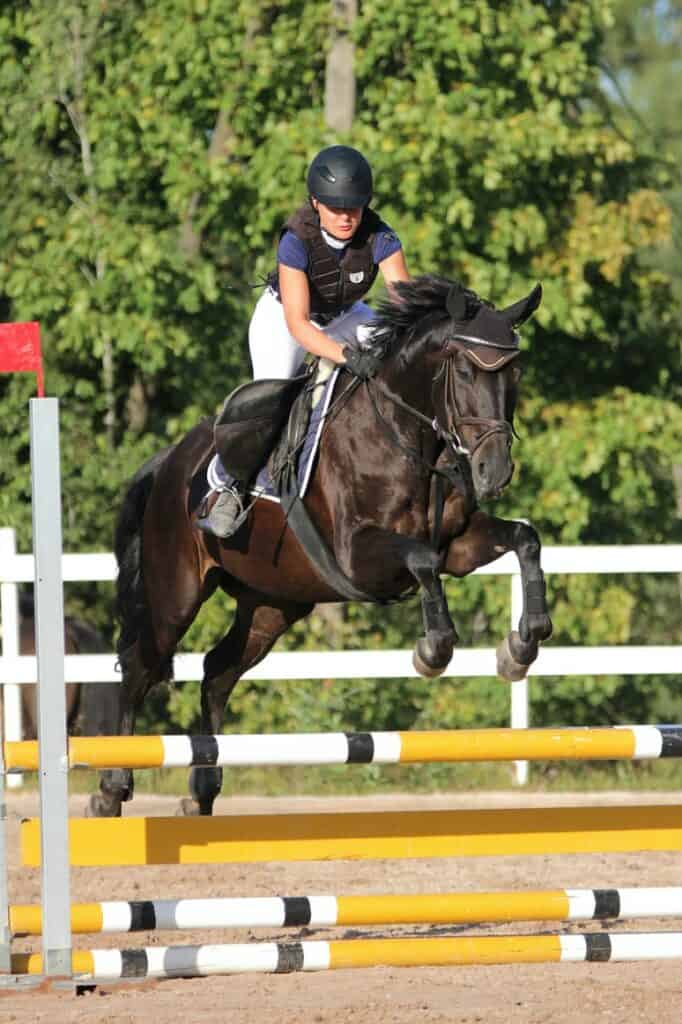
Why is riding considered to be good for horses?
As we can’t directly communicate with horses, it’s challenging to determine a good or bad experience for them. But we can try to make some educated assumptions based on how horses respond and behave in certain situations. Below are 3 common arguments for why riding is healthy for horses.
1. Riding can be an effective form of exercise
A study tracked the movement of Brumby’s in Australia and found the average distance travelled ranged between 8 and 28 kilometres per day. Sometimes horses will migrate up to 55 kilometres a day to find water.
While these numbers refer to travelling for survival, not exercise — they give us insight into how horses are genetically programmed to move regularly.
A domesticated horse in a stable doesn’t need to migrate for survival but still needs to exercise to build muscle, stamina, stay loose and release endorphins.
In the absence of vast pastures and landmass, riding a horse as a form of healthy exercise in captive situations makes sense especially when the alternative is staying in a barn eating hay 24/7.
2. Riding can provide stimulation and enjoyment
When reading the body language of any animal, we have to make some assumptions as to how they’re feeling. Generally speaking, a horse feels happy if:
- Nostrils are relaxed and soft. If unhappy, her nostrils will become tight.
- The lip line should curl down slightly when relaxed. Otherwise, her lips will be tight.
- The lower jaw should be loose and may hang down.
- The tail should be loose and swinging freely.
- Rearing and pawing at other horses are signs that he’s happy. Horses won’t engage with other horses if they’re unhappy.
Equestrian researchers note that heavy breathing and snorting are signs that a horse feels relaxed when ridden. Of course, this isn’t always the case (more on that below).
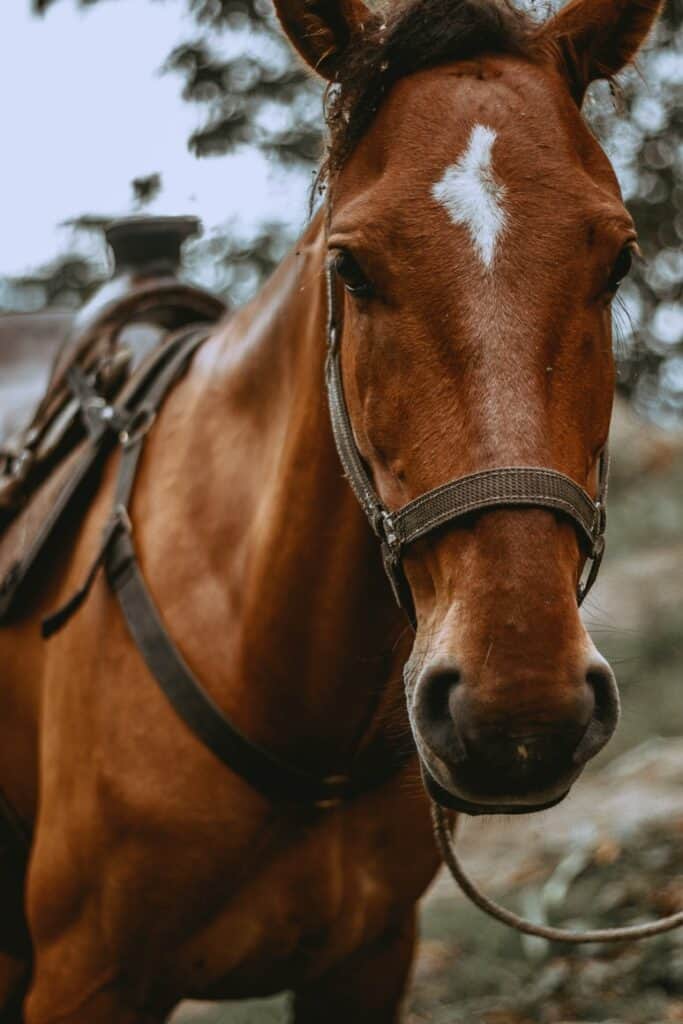
Experienced equestrians who develop deep connections with their horses usually have a good grasp on the personality and mood of their horse and adjust their riding approach accordingly.
3. Horses get food, shelter and protection in exchange for their riding services
Domesticated horses have much to gain from a caring human relationship. Food, shelter, protection, grooming, veterinary care, and companionship keep captive horses healthier for longer.
The life expectancy of domestic horses is about 25 to 30 years, with some living into their 40s (the oldest recorded domestic horse lived to 62 years old).
In comparison, horses living in the wild have shorter life spans getting to 15 years old on average.
This is unsurprising considering that horses are generally kept as pets and don’t have to worry about surviving every waking moment of the day.
Do horses feel pain when ridden?
Horses will feel varying degrees of pain and discomfort when being ridden depending on pre-existing health conditions, age, experience levels of the rider, the weight and height of the rider, amongst other factors.
However, there are some situations where horses don’t feel significant pain when ridden — providing that riders can determine the optimal riding conditions for a relatively pain-free riding experience.
I know what you’re thinking. How do we determine whether a horse is in pain? It starts by understanding horse lameness.
What is horse lameness?
According to the American Association of Equine Practitioners, lameness is a term used to describe a horse’s change in gait (the way they move), usually in response to pain somewhere in a limb, but also possibly as a result of a mechanical restriction on movement.
In other words, any over-compensated or abnormal movement can be seen as lameness or some sort of discomfort.
By analysing lameness and gait movements, researchers can draw reasonable conclusions about pain thresholds for horses. Luckily, I found a pretty comprehensive framework for calculating lameness.
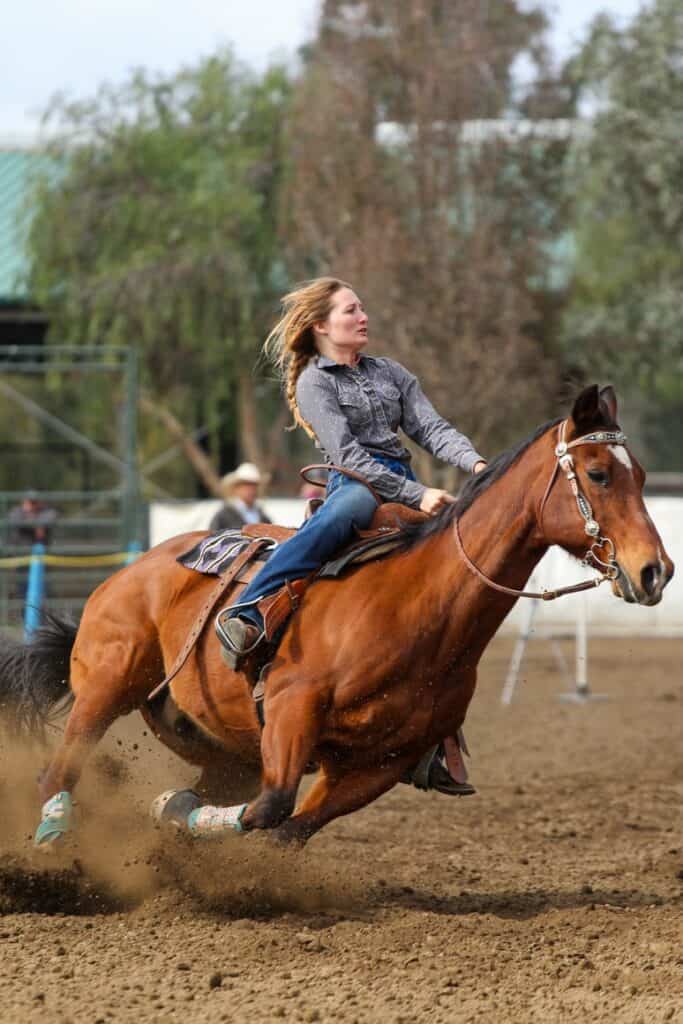
24-point ethogram to determine horse pain
Dr Sue Dyson is an internationally renowned equine vet who has developed an ethogram with 24 markers to determine horse lameness and pain when being ridden.
While scoring systems aren’t perfect, Dr Dyson has done extensive research regarding horse behaviour indicators and has created a reasonably robust framework to point us in the right direction.
If you’re interested in learning more about this scoring system, I highly recommend that you check out Dr Dyson’s free 90-minute webinar, hosted by the charity World Horse Welfare.
To summarise, there are 24 behaviour markers in the ethogram, including:
7 facial markers.

7 body markers.
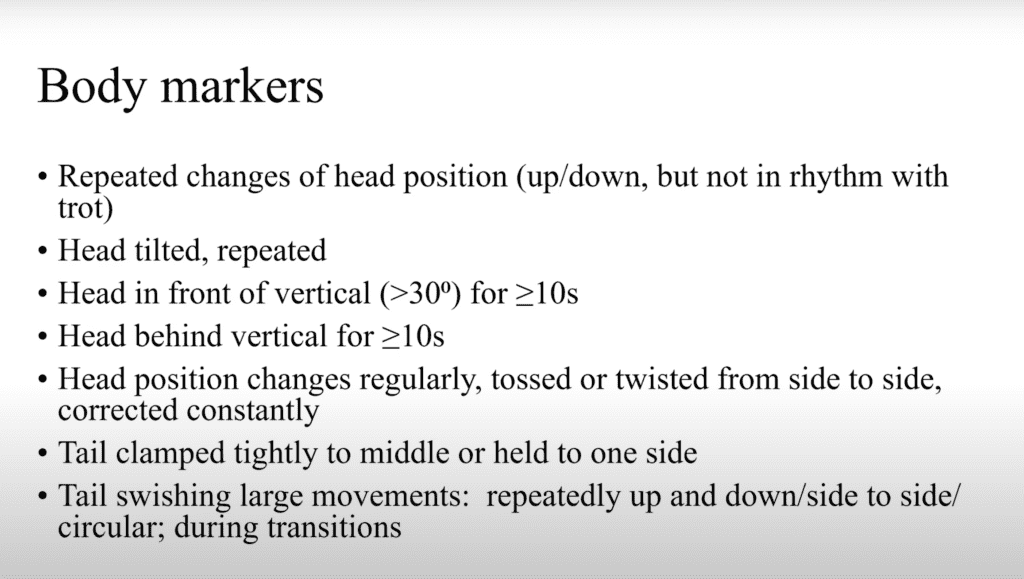
And 10 gait markers.
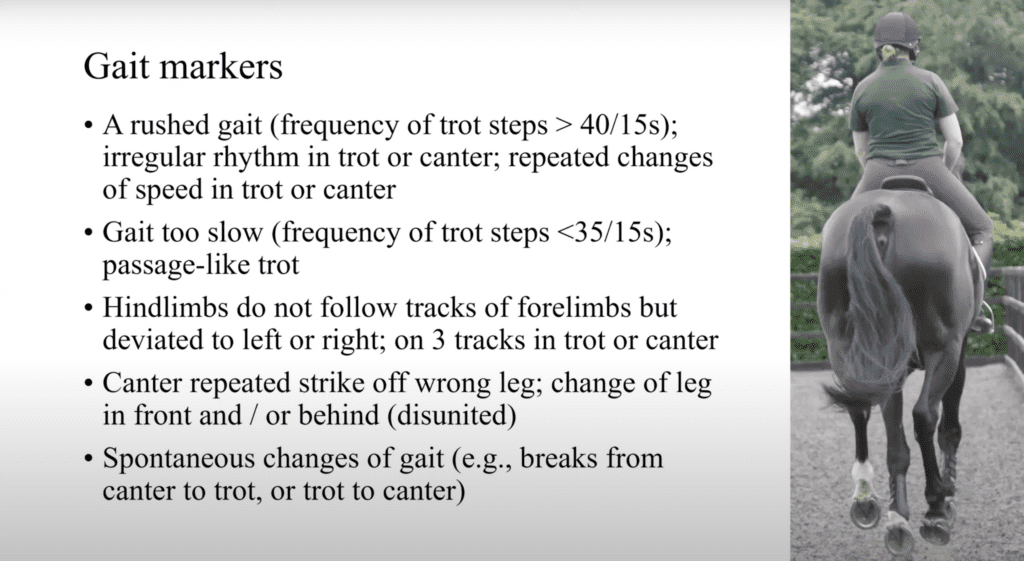
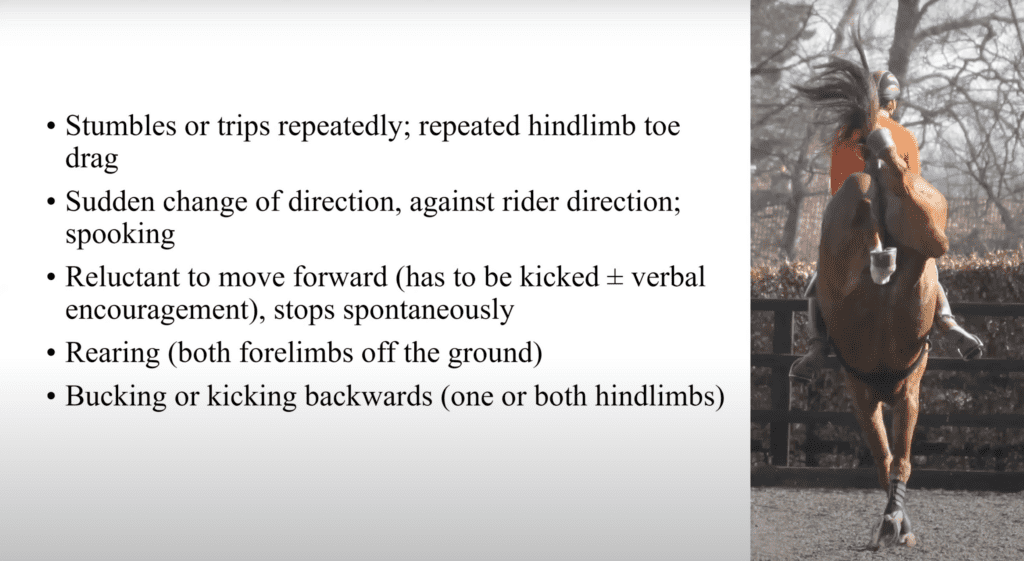
Dr Dyson also found a significant difference in scores between non-lame and lame horses.
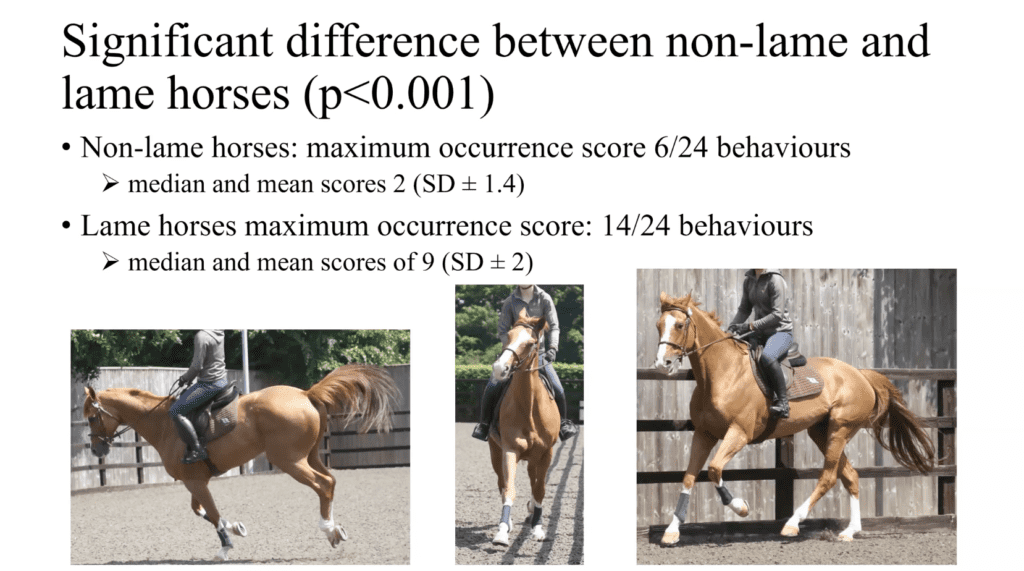
The threshold for lameness using this scoring system is 8/24, which means scores less than 8 = non-lame and scores greater than 8 = lame.
A sample of 57 sports horses, e.g. dressage and show jumping horses, were considered by the owners to be in healthy, non-lame health. After applying the ethogram, 47% of the horses showed lameness, including 12% that were only lame when ridden.
A more recent study of 148 horses (a combination of leisure and sports) found that 28.4% horses were lame in hand, and an astonishing 62.2% were lame ridden.
Both studies prove that horses experience increased pain and discomfort purely from the act of being ridden.
Other factors that influence the scores include the height and weight of the rider. As well as the type of saddle or overall gear used when riding horses.
So yes, horses feel pain when ridden.
The horse racing industry is much worse, with riders often commencing training before horses reach adulthood and fully develop their bones, adding more pressure to their muscular-skeletal system.
Of course, like human athletes, these horses increase their strength, stamina, agility and pain threshold with more repetition and training.
Is it cruel to ride horses?
Horses don’t want to be ridden (at least before training), and research shows that riding causes lameness and discomfort. So on this basis, horseback riding is cruel.
Add a financial incentive or an exchange for horses to “work” for humans through riding services, competitions, and labour, and, likely, humans will unknowingly (or knowingly) push the boundaries of discomfort.
For example, competitive horses need to undergo extensive training and are regularly pushed out of their comfort zone.
Riding lessons can go wrong if the weight and height of the participant doesn’t match the appropriate threshold for the horse, but the trainer looks the other way and proceeds anyway.
I know there’s a group of considerate horse lovers that do their best to check every box when training and riding horses. Some of these folks treat their horses better than themselves. But they only represent a fraction of the industry.
As Dr Dyson said at the beginning of her presentation, many owners and some veterinarians are not skilled at recognising the presence of lameness in horses — despite their best intentions.
This is further perpetuated by horse breeding. Horses are bred into captive environments where they’re expected to perform and be ridden.
It’s one thing to adopt a horse who’s been living in a barn all day or is about to be shipped off for slaughter. In this context, a loving horse/human relationship is better and frankly nobler than doing nothing — especially when you consider the costs and time involved to support that horse.
If you’re one of these people, I want to acknowledge your incredible commitment to these animals.
But supporting a cycle of breeding horses to spec for performance, aesthetics and other preferences, knowing that they don’t want to be ridden, and knowing that most riders don’t have the adequate knowledge to see behavioural signs of lameness, is nothing but cruel.
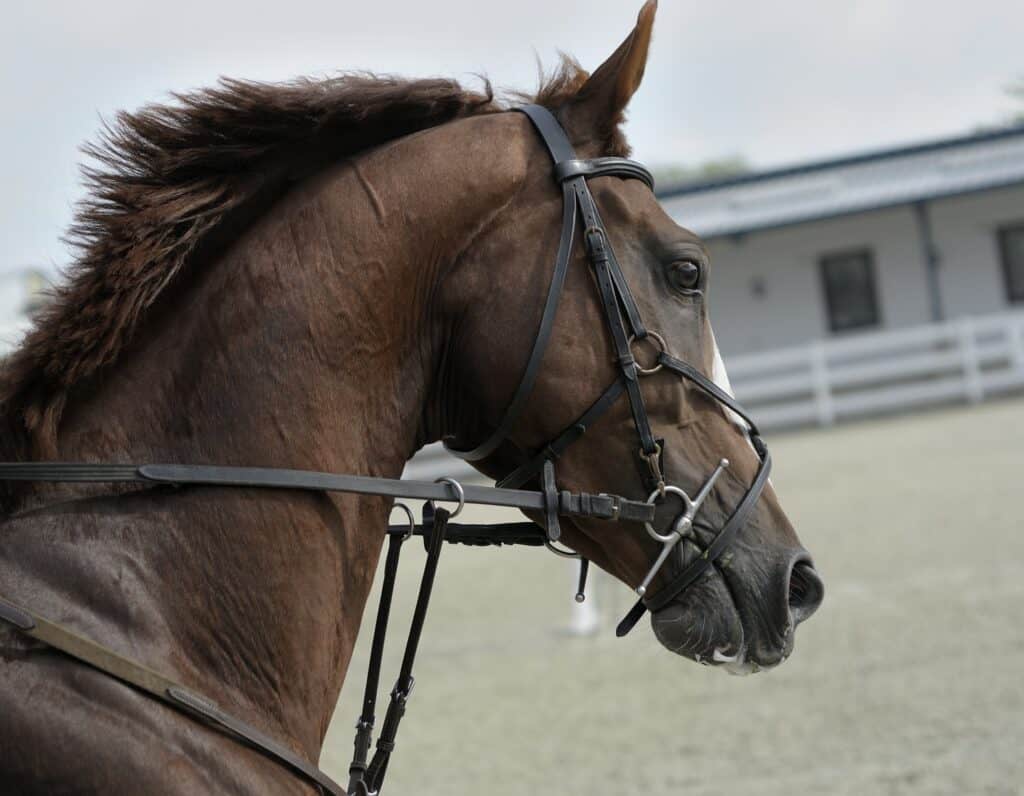
In what situation is it ethical to ride horses?
Let’s keep in mind that we’re trying to make an unideal situation suck less. Even when considering the stresses of living in the wild vs the perks of domesticated living. With their herd, horses in the wild make for a fully enriched life. Take the good with the bad.
It’s unnatural for horses to be ridden. Still, we’ve created a situation through domestication, performance and commerce that all we can do now is make the experience less painful for horses.
If you still desperately want to ride your horse, which to an extent, I can understand. We’re talking thousands of dollars of monthly upkeep here.
So folks aren’t going to invest all that time, money and love without the expectation of being able to ride their horse. Although I’m sure there are exceptions.
Here are three criteria for cruelty-free horseback riding:
- Adopt don’t shop. Similar to the dog breeding industry, adopting horses is a net gain for each horse saved from an otherwise bad situation. Don’t let the demand for riding horses promote an endless cycle of breeding an excessive supply of domesticated sentient beings that ultimately get exploited and often turn into dog food.
- Create an environment for your horse that allows them to interact with other horses, have the freedom to roam and explore, and forage for food. According to professor Natalie Waran, these are known as the 3 F’s (friends, freedom, food).
- Educate yourself on how to understand the lameness signals of your horse. Dr Dyson has a course on recognising the 24 behaviours indicating pain in the ridden horse. Once you know, be sure not to cross the pain threshold for your horse.
Meeting the above criteria gets us closer to safe, cruelty-free horseback riding.
As you can see, you need a massive commitment to tick these boxes and if you can, amazing! For everyone else, perhaps it’s best not to ride horses to avoid any potential harm.
What do you think? Is it unethical to ride horses?
While horses are likely to live a more enriched life in the wild as herds, our history of breeding and domesticating these beautiful animals means we need to develop sophisticated practices to significantly reduce pain and discomfort when riding.
I’d love to hear from you now. Do you think horse riding is cruel? Is there such a thing as cruelty-free riding? Let me know your thoughts in the comments below.


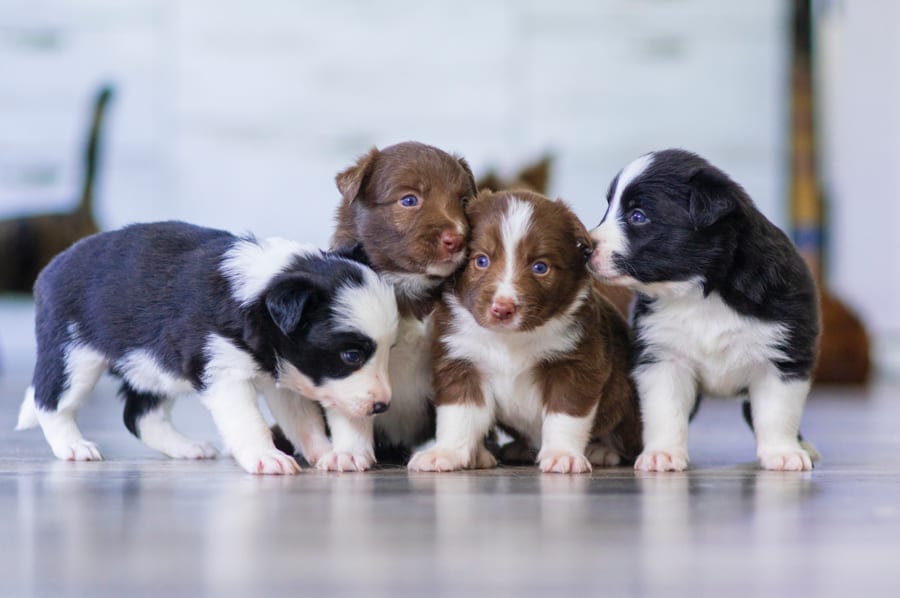
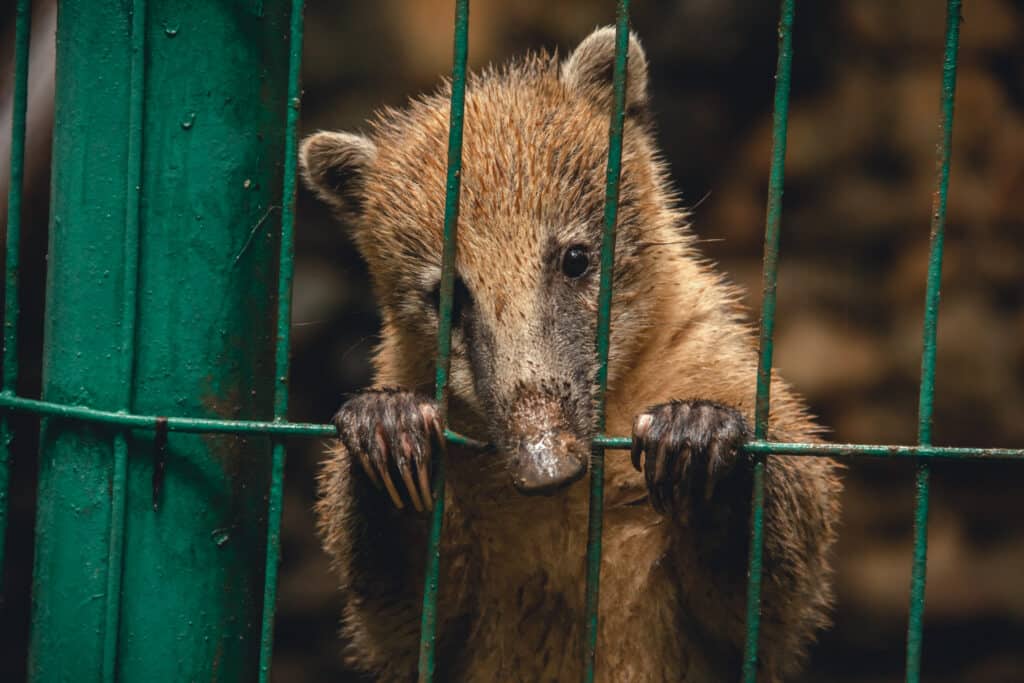
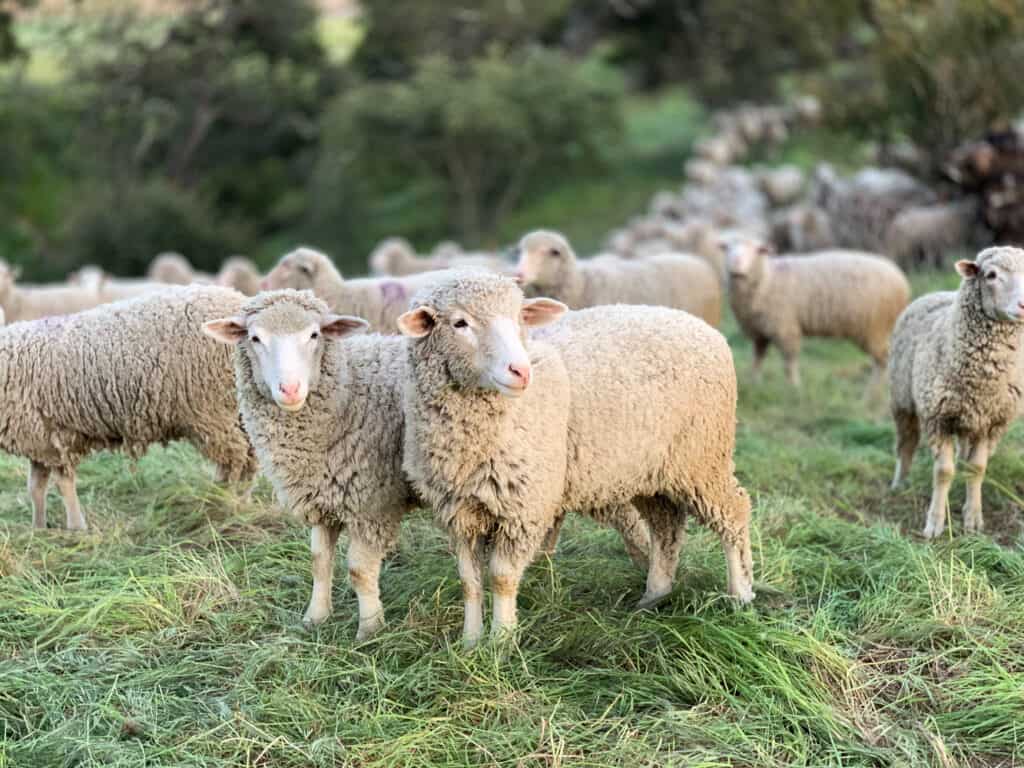
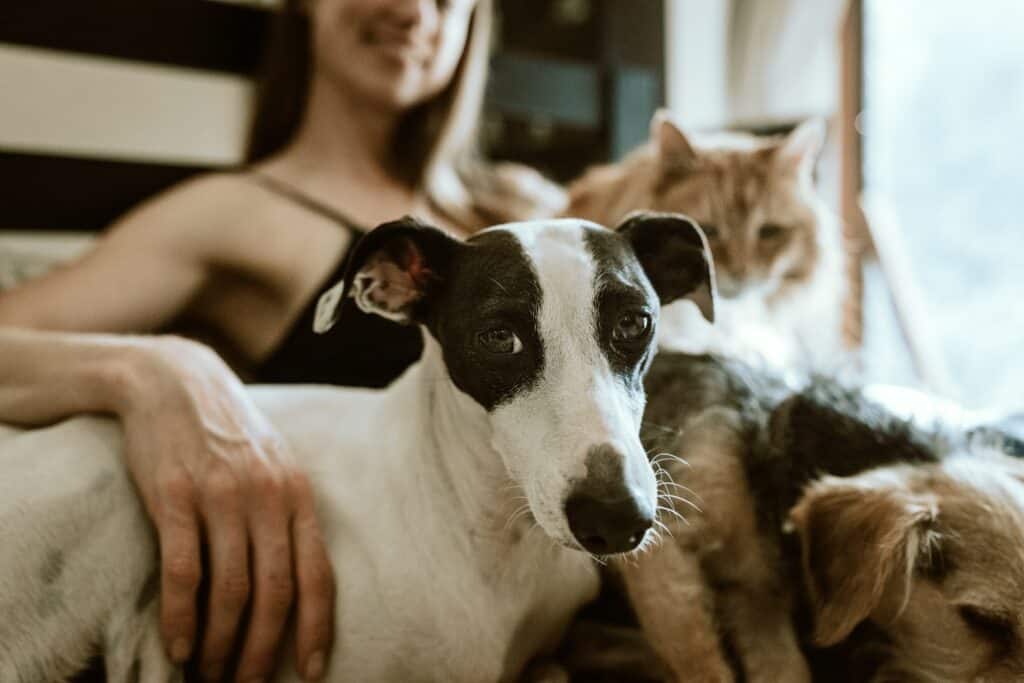
I’d like to ask is it the riding that’s the problem or the tack what is the effect of bareback riding Vs with a saddle girth etc. and what is the effect of bitless bridles vs with a bit ? Also is there the case to be argued of horses loving what they do. I’ve ridden many horses both before and after becoming vegan and sometimes you can just tell they love jumping when they’re not being ridden and are in a field they’ll sometimes jump for fun and other times when jumping they’ll get excited by the prospect of the jumps show by pricking their ears forward accelerating a lot and sometimes a buck or two after the jump? So yea those are my 3 questions effect of tack Vs no tack or different less invasive tack and what if they enjoy a particular riding activity?
Hello there.
I found this article as I have been trying to search and get an answer on whether Horse riding is inherently cruel or not and after receiving a rather insulting, hurtful, aggressive and, quite frankly, rude response from a vegan when politely trying to question and debate this with them (although please know that I am not against or mean any offence to anyone, vegan or otherwise).
I used to ride horses and loved it, at multiple riding schools, but I ultimately gave it up because each riding school I went to didn’t seem to truly care about or respect the horses in my view and only seemed to see them as commodities in my eyes (although I understand not every riding school is like this). If I ever had enough money and land, I would desperately love to adopt an ex race horse or 2 and give them a good life with me. I do love riding and I will admit that I do miss it but my stance would be if the horse/s I adopted didn’t mind being ridden, I would happily ride them but I wouldn’t use a bit, a whip, spurs or anything made from leather on them and I would always think about the horse/s first, let them decide the most way I can and give them the best life possible but, in contrast, if they didn’t want to be ridden, had health ailments that would certainly make riding very painful for them and/or were getting older, I would respect that and just not ride them.
I don’t personally don’t see exploitation as always a bad thing as long as the animal or human is being looked after, truly loved and is living their best life possible as after all, some people could class having any animals, dogs, cats, rabbits etc (even adopted) as being cruel, slavery and exploitation but I can say as a guardian of 7 cats, 1 dog and 2 rabbits (all adopted), that calling the love between us slavery I find is very, very hurtful and offensive to me. I love them all to bits, would do anything for them and I would literally rather die than live without them. Plus, we can’t change time and reverse domestication and releasing all these animals into the wild now is nothing short of cruel and irresponsible, so all we can do is do the best we can for them. Plus, in the nicest way here, in my eyes, everyone exploits someone, animal and/or human, in some way or another at some point in their lives (I don’t think it can ever truly be avoided in life) such as some could say that living with their parents when 18+ is exploiting their parents or not allowing their child to do something, even if it is detrimental to their health, is cruel, or an employer is exploitating their employees or house cleaner for doing stuff for their own means which they could do themselves or needing to find a partner and use that partner in order to have a child exploitation (exploitating the partners body just for something you want).
I know then some people would say about consent but in reality, unless we find someway in the future of actually being able to translate animals words into our our own, which we may be able to do one day but until then, we are never going to be able to get animals verbally or written consent, so all we can do is try and get it physically, based on what we know, and always think about the animal and what is in their best interests first before our own and act accordingly. Every situation is different. Some could even say that vaccinating, spaying/neutering, operating etc on an animal (even in order to save their lives) is wrong because we can’t get their verbal/written “consent” but what would be the alternative? Letting them suffer and die as a result of this inaction? Wouldn’t that be causing uneccessary suffering and cruelty to them?
Bottom line, I know not everyone on here will agree with me and that’s okay as everyone is different and has different views and experiences (all I ask though is that you please aren’t aggressive or rude, as there is no need for it even if your opinions on something are very strong), but I personally feel that riding a horse is ethically acceptable as long as the horses welfare and happiness is paramount to anything else, you treat the horse with love and see them as a sentient being and individual, you don’t just “dispose” of them when you see fit and you are trying to give your horse/s the best life possible. We can’t change the past or the entire world, all we can do is do the best we can at this moment of time, looking at the entire picture and not just a small fragment of it.
Of course horses consent to being ridden. In a rodeo, 8 seconds is considered a good length of time to ride a horse that’s not happy about it. You can’t scare them into allowing it either. A scared horse is one you’re likely to rapidly part company with.
They also get something out of it. We’ve bred them to be intelligent, and they need stimulation. You make an assumption that their life would be richer in a wild herd, but that’s not even close to being proven, and I personally think it’s unlikely.
You cannot just let horses out into the wild either. Look up the environmental damage that feral horses are causing in Australia, for example (where they’re known as brumbies).
Not allowing horses to be kept by humans means no horses at all. It would be a great shame to lose one of the very few species that actually like us.
Tell me you’re not vegan without telling me you’re not vegan. No it’s not in any way ethical to add your weight to the back of an animal. Horses don’t want to be ridden. They want food, safety, and to be around and procreate with their own kind. Everyone here that owns horses or says that they’re a horse trainer is so bogged down by their cognitive dissonance that all they’ll do anything to justify their cause.
Eating meat is not wrong because other animals do it. Just admit it equestrians, you’re not vegan, or a horse, so you don’t actually know how the horse feels, you just want to continue enjoying your hobby. There’s nothing wrong with telling the truth, but to lie and say it’s not cruel when you’re adding a massive amount of weight to a horse’s back is delusional. Imagine if another animal or the equivalent in human terms did that to you without your explicit consent.
Piggybacking isn’t easy or something humans do often, do you think it’s easier for horses? Plus, since you can’t actually communicate with them, how do you know it’s not cruel? Through which *neigh* did the horse say “I’m okay.” People’s interactions with wild animals are all based off of assumptions, not verifiable facts. Maybe if we had a way to translate it through technology, but I bet that kind of company would go bankrupt or be protested in no time. People wouldn’t be able to handle the fact that their pets and horses don’t love them. They love what they get from you, food shelter, and safety. In the case of horses, they probably hate you every time you sit on them.
Anyway non-vegans, that’s all I have to say on the matter.
Horses weigh thousands of pounds, an average sized person riding a horse isn’t realistically a massive amount of weight. Just sayin’. What I’m mostly curious about is the opinion of dogs who compete in completions such as agility etc. Is that also considered cruel? Those dogs are being trained, I guess against their will if we are riding the wave of logic being used here with horses. In fact maybe we shouldn’t have pets at all? If I’ve learned anything thing here about Vegans it’s that perhaps you all may benefit from lightening up a bit.
Hi I’m a vet nurse and an horse owner so I do have a good educational back ground for the care of animals and I also recognise the unspoken body language of horses too. I have an ex racehorse from a really caring rescue team. My horse is currently learning to be a chilled out pleasure horse instead of a super hyped high adrenaline racer. She has a saddle fitter at this point every 3 months , a physiotherapist every 6 months , 3 monthly dental checks . We are quiet and gentle with her . The reasons I know she enjoys working with me ( nor for me that’s the important bit) are – she never backs off being tacked up , she doesn’t shy away from letting get on her( always from a block and Never from the ground) she strides out with ears forward and a relaxed face. We adore each other and pretty much every ( not all of course) rider I know is like this. They are our fur babies , our life long loves and we would just not ride if they were ‘ in pain’ also being able to ride lightly ( with an independent seat) makes a huge difference too. No horse should have a sack of potatoes banging about on their backs. I love riding I’m not rich far from it but I love my horse x
The vegan principle that animals are not here for our pleasure, food or use is a good guide.
In essence it means leave animals alone, relate to them in the wild. Don’t lock horses up in stables and put metal in the mouth and rains and saddles and heavy people on their backs.
Same principle says don’t have pets, if we want a pet, get an electronic furry thing. Don’t OWN animals. That’s slavery.
Animal sanctuaries that let saved animals live out their lives in freedom without being exploited must be a good thing.
Equestrian here…
1. We don’t “lock horses up in stables”. They roam in paddocks 99% of the time, and would only spend a very small fraction of time in their stables for the following reasons: if they are injured and need to be limited from walking to help them heal. To be kept clean overnight for a competition. To eat their meal in peace without being disturbed by other horses. If it is dangerous outside (thundering storm, etc.). They need a procedure done (e.g. farrier, teeth, vet check…etc.).
2. The “metal in their mouth” is called a ‘bit’. It is only used to help control the horse, and to keep them and their rider safe whilst being ridden. Bits, when used correctly and fitted correctly, do not hurt a horse.
3. It’s reins, not rains. Reins literally are just connected to the bits and help steer a horse. They literally do nothing to hurt them at all, and are not even touching the horse unless they are gently against a horse’s neck….
4. Saddles is just where a rider sits. Fitted correctly and used responsibly on the right horse, it is not heavy or painful. Horses are big animals, a saddle is around 12ish kg (varies around that), doesn’t effect the 700-1000kg horse.
5. Heavy people on their backs…. an average person to ride a suitable horse is fine, again, not much weight for the strength of a massive animal. However, I (and many equestrians) do not agree with very overweight or obese people riding horses. The animals do have their limits, and that is something I stand by. Placing a very obese person on a horse is cruel and unfair.
David, owning animals is not slavery if they are being cared for, looked after, upkept and loved. I don’t think a real slave would be properly cared for, looked after, upkept and certainly not loved, so comparing the two is really far-fetched, and some could find offensive.
We are not enslaving our horses by feeding them healthy feeds, paying endless bills for their health to be upkept, providing them with shelter and care, washing and grooming them, getting professional help when they are sick or injured, providing love for them, spending time with them, cuddling and talking to them, exercising them for their health and stimulation…
I really urge all vegans to not just label any animal ownership as slavery. There is a major difference between animal enslavement and animals as pets that are loved and cared for. Animal enslavement would be something like bears being forced to perform in some countries, and being neglected, abused, not properly looked after. To compare something as cruel and horrific as that to someone owning an animal, loving and caring for it… it’s just absolutely delusional.
I am a vegetarian myself, and I am 100% an animal lover and want the best for them (became vegetarian for that very reason!), but it just infuriates me to see vegans taking it this far.
Please properly educate yourself before ranting about something such as labelling ALL animal ownership as slavery. Save yourself the embarrassment, and think of better ways to spend your time helping animals and the environment. Thanks.
It’s still exploitation. I’m glad you take care of the horse way better than most people do, but that does not mean it isn’t exploitation if you’re riding it. I think it’s okay to have a domesticated pet as a companion, as many will not survive in the wild, (I don’t know if it’s the same for horses), but to ride it, I think goes overboard and into exploitation. The reason it probably let’s you ride it, is because it was trained to do that. Had it not been trained to submit to a rider, it definitely would not let you on. So you are exploiting its own initial abuse, but just in a nicer way. Still exploitation. Don’t ride them.
Pretty! This has been a really wonderful post. Many thanks for providing these details.
Very well presented. Every quote was awesome and thanks for sharing the content. Keep sharing and keep motivating others.
Good article.
I would ask a different question.
Instead of “is it cruel to ride a horse?”
which implies, the option to ride a horse is reasonable and therefore debatable.
I would ask “Do horses exist for human pleasure?”
or “can non human animals consent to being used?”
and
“Can a human unilaterally determine whether an animal gives consent?”
and
“Why can’t we just leave animals the fuck alone?”
and
“Can slaves enjoy serving us, if we feed, house them and teach them to read the bible?”
“If a slave smiles and their lower jaw is relaxed, does that mean they are happy?”
Or ask all the horsey questions and substitute “slave”
You can absolutly work with horses in a way that encourages communication. I think it’s flawed to conflate horse ownership to slavery. Yes by law a horse is the owners legal property, but a horse owner can have a relationship with a horse that is oneof legal guardianship. In that way you can relate compassionate horsemanship to a parent child relationship.
Is a child a slave because they can’t run off on their own? Is a child abused because their parent encouraged them to do physical activities? Is a parent cruel for framing those activities in a fun way?
Humans have relationships with each other because they enjoy those relationships, it’s the same with animals. I have many relationships with horses that are not my own, in fact my horse is technically not legally mine as per the adoption agreement
Yes horses can consent to riding and often do when trained in ways that frame it as an enjoyable cooperative activity. When you stand at the mounting block and your horse crosses the arena to place himself where he can be mounted, it’s safe to say he is a willing participant.
It reasonable to assume many horse person relationships are exploitative, but things are changing in horse people culture and more and more people are f8nding it unacceptable to treat horses as anything less than a partner.
Equestrian here.
Well, David, that is because the option to ride horses is reasonable (I guess you could say that then makes it ‘debateable’ for some).. “Do horses exist for human pleasure?”.. Nope! These beautiful animals exist for many reasons, and are not strictly narrowed down to ‘human pleasure’. Owning a horse is both ‘pleasurable’ (not saying that in a weird way by the way!) for the horse and owner. Horse gets love, care, food, upkeep, exercise and simulation, and the owner gets out of this a love and bond with their horse, and fun, interesting riding times for both the horse and rider! “can non human animals consent to being used?”… For this example, horses, they can’t necessarily verbally say yes or no, however their body language prior ride can give the owner a hint. If the horse is visibly in pain, or scared, or agitated, this is a big tell-tale for the rider not to ride the horse that day. The rider will do the best they can for the horse. “Can a human unilaterally determine whether an animal gives consent?”… Like I said before, horses can give you big hints into if they want to be ridden that day or not! We have to work with what we have, as horses cannot verbally speak our language. “Why can’t we just leave animals the fuck alone?”… because MOST humans love and care for animals, and want to provide them with that. If I just let my horse go, he would probably die, getting hit by a car or something. He’d want to come back to his proper feed meals, grooming, friends, love and care. If I saw an injured animal, or a lost cat, I wouldn’t just leave it alone. I’d go out of my way to help it. “Can slaves enjoy serving us, if we feed, house them and teach them to read the bible?”. “If a slave smiles and their lower jaw is relaxed, does that mean they are happy?”
“Or ask all the horsey questions and substitute “slave”…… David, owning animals is not slavery if they are being cared for, looked after, upkept and loved. I don’t think a real slave would be properly cared for, looked after, upkept and certainly not loved, so comparing the two is really far-fetched, and some could find offensive. We are not enslaving our horses by feeding them healthy feeds, paying endless bills for their health to be upkept, providing them with shelter and care, washing and grooming them, getting professional help when they are sick or injured, providing love for them, spending time with them, cuddling and talking to them, exercising them for their health and stimulation… I really urge all vegans to not just label any animal ownership as slavery. There is a major difference between animal enslavement and animals as pets that are loved and cared for. Animal enslavement would be something like bears being forced to perform in some countries, and being neglected, abused, not properly looked after. To compare something as cruel and horrific as that to someone owning an animal, loving and caring for it… it’s just absolutely delusional. I am a vegetarian myself, and I am 100% an animal lover and want the best for them (became vegetarian for that very reason!), but it just infuriates me to see vegans taking it this far. Please properly educate yourself before ranting about something such as labelling ALL animal ownership as slavery. Save yourself the embarrassment, and think of better ways to spend your time helping animals and the environment. Thanks.
This is just wrong and incorrect!!
I have read the article and it is not true. Most horses generally don’t mind or enjoy being ridden. It gives them something to do and let’s them blow off some steam.
Before I start I am a diploma qualified behaviourist, diploma qualified in animal welfare as well as a mum and brother both as practicing vets!
I’ve had horses my whole life and i still currently have 2, both were jumpers one is now 34yrs old and is adopted from ‘World horse welfare’ as a riding horse so how concluded that horses cant get ridden if here adopted is utter rubbish! This little mare competed with me in affiliated 4ft jumping classes! She is completely retired now and the other is retired from competition only and is still ridden 3 times a week.
I can professionally say that both are completely sound as I write today and always have been throughout there 15yr career with me. Just like the vast majority of all other ridden horses and retired ridden horses… sound as a pound!
So where you get your information from I don’t no but it can’t be from real horsey people nor equine vets nor people that have owned and ridden horses there entire life nor equine manipulators and nor an equine biomechanic specialist!
This theory is rediculous and i can prove it by discrediting one thing in your statement using your own words! But first let me educate you on how a lot of people break in horses these days to which if they didn’t want a saddle, bridle or a human on them they wouldn’t, simple as that.
We use there own language and ask them to except us they have a CHOICE, whether to except getting ridden or not, we’ve moved on from the forcing, violent days where we were making horses do things! i won’t explain in detail as ill be hear all day so just look up ‘Monty Roberts’, that’s how we do things these days! Its called operant conditioning and P.I.C.N.I.C the same methods i use to train dogs.
Right to discredit your theory that riding a horse makes them all lame and cause pain.
Riding don’t make them lame or in pain the confirmation of the horse does, the surface/ ground you ride them on does, a lack of the correct support boots in disciplines they do, like eventing and show jumping, wrong fitting tack does and an over weight rider does!
You then go on to list the signs of a lame horse were nearly all correct! However the majority of the point your trying to make is that riding horses makes them lame no matter what. So then how do you explain the vast majority of ridden horses that don’t show any of those signs?
The explanation is that ridden horses that don’t show any of those signs ARE NOT IN PAIN only the ones that do show the signs, so how can you say that riding horse makes them lame or in pain when if it did surely you would see the signs in every horse, Right!?… But u don’t.
It can’t be both! Lameness signs cannot mean lameness and soundness and it’s exactly the same with pain. The first place a horse would feel pain because of being ridden is in there back, have you ever tried to ride a horse that has developed pain in it’s back? If you did you would spend most the time on the floor or the horse trying to deposit you on the floor.
So if a horse is not in pain then it won’t behave in this way or out of character.
Nailed it! You are much more qualified to this discussion than any so called expert!
Thank you!
“We use there own language and ask them to except us they have a CHOICE, whether to except getting ridden or not”
What a ridiculous argument. That’s like a slave owner saying – “Oh! My slave doesn’t run away or revolt so that proves that he is happy being exploited”
“So then how do you explain the vast majority of ridden horses that don’t show any of those signs?”
Literally read the article where he mentions that 47% of lame horses and 62% of non-sporting horses were lame, at least when ridden.
How you can claim to be so qualified and have the reasoning and comprehension ability of a 4th standard child I really don’t know. And you don’t even know basic spellings like “accept” and “ridiculous”? You’re definitely lying.
I am a retired competitive, show jumper. I am fortunate in that my horses stay with me until they die and are buried on my farm. However, I have come to believe that riding horses, especially with bits and spurs, is cruel.
I feel sad that I abused my dear equines all these years by riding them in such, and not be educated by the likes of Dr. Sue Dyson on the signs of unhappiness, while professing to love them and thanking them for saving my life. I did however, go with my gut, and retired those who told me they were done. Thank God for that.
My three horses are turned out now with companionship, big paddocks, deep sheds and fresh water. They seem to be happy, now.
Thank you for this article. Blessings on man’s true best friend-the horse.
Better late, than never.
How is everyone posting a comment on hear because I cant find where to write a comment apart from replying to someone like I am you?
Do I have to sign up to this site? If so where is he option for that as cannot see that either. 🤔
Thankyou
I grew up with horses, both for pleasure and working cattle. None of our horses moved away from us when be saddled. A number of them seemed excited and came to us at sight of the tack coming out. We used bitless bridles and our horses were well fed and cared for with good veterinary care as needed. We enjoyed our interactions with them and they seemed to enjoy our caring for and brushing them.
I’ve been around horses most of my life and have never met a that was ‘hurt’ regularly while riding unless there was an existing condition. Which in most cases, you can spot. My almost 20 y/o geldings will stand with me in his pasture unprompted while I clean his trough just because he likes me and wants to be around me. He also gets excited every time I take him out to ride. Sometimes he acts spunky in our warm-ups, but that’s all play. I can tell based on his body language and how interacts with me if he is enjoying something or not. Tack and other equipment can be a source of pain, but only if it doesn’t fit the horse. Again, my gelding had an incorrectly fitting saddle that was hurting him, so he reacted by bucking me off. Once we determined it was a tack problem we fixed it by getting one that fits him and he hasn’t bucked me since. He actually gets depressed and will move around in his pasture less if I don’t ride him regularly, and he gains a lot of weight. Obviously riding old horses (Late 30s to early 40s) can hurt, and if a baby has its mounted training started too early it can cause arthritis in later years, but a large majority aren’t, and if they are, they aren’t ridden. A vast majority of horse people pay a lot of attention to their horses and know when something is off if the horse is hurting, and how to take care of them.
This article you wrote is very inaccurate, horses like being rode. Yes some horses are or were abused but most horses actually like being rode and in joy spending time with their rider. I have a mare who loves being rode and might have been abused when she was younger but she still loves being rode just like all of the other horses i’ve seen and rode.
I’m an equestrian, but unlike many others in this thread, I only started riding about 1.5 years ago. I greatly enjoy riding horses and I’ve noticed that it has improved my general wellbeing in many areas of my life. For these reasons, I want to keep riding. However, I can’t help but to think about the ethicality of this hobby.
The argument of horses being ridden as compensation for food, shelter, company etc. being a fair trafe holds true to an extent, in my opinion. But only if certain conditions are met. Let’s say that in a hypothetical situation, there is a horse named Dapples who lives on a private yard with a few other horses, all owned and taken cared of by the same couple of people. These people are experiensed horse owners that put their horses needs first. Dapples has all of her needs met: food, big pasture, shelter, exercise and horse friends. Her owner rides her four times a week in fitting tack and makes sure that Dapples doesn’t get any tasks that are too demanding. After riding, Dapples gets back to eating in the pasture with her horse friends. I think the horse is happy in this situation and doesn’t mind being ridden. Sadly, not many horses get to live a life like Dapples.
In most cases horses don’t have all their needs met and will be ridden even if they show clear signs of discomfort. This can be due to many reasons, but none of those reasons justify the suffering of a horse. If a person doesn’t have enough money, time or motivation to keep a horse so that the animal is happy, they shouldn’t own a horse.
What I find the hardest part to think about in the horse world are the riding schools. I just don’t know how to justify riding lessons. Of course, there are good riding schools that take care of their horses and make sure that the horses aren’t overworked. Most schools though, in my experiense, don’t have the resources, time or in some cases the will to do this. Horses in riding schools don’t get the veterinary care they need, they have pastures way too small for them and don’t get to live in a herd. They are stalled for most of the day and do long days of 2-5 lessons in possibly ill-fitting tack, being ridden by amateurs who (understandably) do a lot of mistakes while riding. Some of these mistakes are painful to the horse but probably all of them are at least uncomfortable.
To make sure that the horse is comfortable while it’s ridden, a rider needs to have skill and experience. To get that skill and experience, a rider needs to be taught by someone. Most likely the rider will choose lessons from a riding school, since very few have enough money to just buy a horse and get a private instructor to teach them. It feels unnecessarily cruel to have these lesson horses suffer for the sake of other horses. We need riding schools if we want to learn how to ride so that the horse is comfortable while we ride.
There are horses that enjoy riding, jumping and showing. But I think those horses that truly enjoy showing in competitions, for example, are so far and few between that it doesn’t qualify as a point to me. Some humans enjoy getting beaten up by someone, does that mean that the rest of us should enjoy it too?
I’m glad I’m an empathetic person. I’m glad I care about these things and that I think about them even though it hurts, because sadly, many equestrians don’t. It astonishes me how fiercely some of us defend this sport. If the horse world looks bad, unethical or conserning to the outside world, then isn’t that a ckear sign that we’re doing something wrong and are in need of change? I think some of us are blind to the abuse that happens in the horse world, because it is seen so often that people get used to it. And if that isn’t messed up then I don’t know what is.
This is such a long reply that it could be an article in and of itself…just proves that this article made me think. I’d love to discuss this more so if you agree/disagree/have something to add, don’t hesitate to reply!
I am an equestrian, and i would like to get it out there. Horse riding is not cruel. If a horse is lame, it will most probably show that it is lame by not cooperating or limping. Also, horse riding, apparently to you, is ‘unnatural’. There are many things in this world that are unnatural, but not all of them are bad. And unless being abused, most horses do not feel pain when being ridden. If tacked and prepared correctly, they should not even be uncomfortable during riding sessions. Responsible instructors should check the tack if the child/adult is not fully comfortable with tacking. But no, horse riding is not cruel.
I am a professional horse trainer (of the humane variety). I specialise in horses who have developed strange behavioural attitudes (usually, but not always through misguided treatment/training) and have two points to make.
1. Dr Dyson’s guidelines are so encompassing as to be of little use. There are so many reasons why a horse might display any number of the characteristics Dr Dyson lists as signs of lameness as to render the 24 point plan of limited value on a practical level. The inclusion of such a wide range of behaviours as signs of lameness will (and does) automatically lead to an over-estimation. It seems that everybody is looking for simple “12 point plan” for everything that can be read and easily digested on an iphone, but there is no substitute for horsemanship, however cold it is outside today.
2. Horses are like teenagers in many ways. Proudly independent but needing gentle guidance – not becasue there is anything wrong with what they are saying (teenagers can often be devastatingly correct in their world view) but because as parents, our job is to help them prepare for the real world. Horses, may also show reluctance to work sometimes but, again like teenagers, are generally happier when they get off their butt and find some direction in their life. Many horses who find such a purpose often exhibit the same type of deep happiness that many humans develop when they know their direction in life – a kind of equine professional pride. Such a person may have gone through some challenging times to get to that point, and so it is with horses. If you apply Dr Dyson’s plan to horses, many healthy horses would be classified as lame and very few of them would ever find their place or develop their skills. Simply put, whatever parenting approach you have towards teenagers, I think we can all agree that cosseting them and never allowing them to overcome challenges rarely turns out well.
Finally, I would make thepoint that describing horse riding as ‘unatural’ is not the slam-dunk you seem to think. It is not ‘natural’ to clean your teeth or use an iphone either, but these are definite benefits. What we should be asking is not whether something is ‘natural’ but whether it brings real-world benefits and I would argue from a lifetime around horses that a horse that stands in a field all day is an unhappy horse compared to one that has a role that he/she understands.
Wishing my fellow vegans and veggies all the best,
Rick
Lame……..pun intended! Justify it however you want to make yourself feel better about owning slaves. Your teenager has a CHOICE, your slave horse does not. Your selfishness is harming another living being. End of story!
Please… are you really comparing horse ownership to slaves?? 😳😳😳 Yikesss Steve. Yikes.
Many many many vegans exist with pets that they love and look after, including horses! Like omggg…. you took your dog on a walk on a lead… SLAVE! Omg! You fed your dog a healthy meal.. ITS A SLAVE!! No way… you are cuddling up with your dog INSIDE your house… on the couch! SLAVE SLAVE SLAVE!! Like, do you know how ridiculous your labelling is?? Literally, I feed my horse fulfilling, nutritious meals, put a lot of time in effort into grooming him, washing him and caring for him, giving him gorgeous massive paddocks to roam around in, spend thousands and thousands of dollars on vet bills, farrier bills, teeth bills, love and cuddle and spend time with him, exercise him, keep him healthy and fit, stimulate him…engage his mind. You label that enslavement. You label that selfishness. You label that harmful to him. Wake up mate: it’s far from it. Labelling that ownership enslavement is far-fetched, delusional, and many would actually find using that term on a horse with a great life is actually really offensive, considering how real slaves have it. Mate, I’d recommend instead of ranting on about how horse ownership is slavery, go and do something that would actually help animals and the environment, if that’s what you’re all for.
Thanks for writing this article. I found both it and the comments very interesting.
I’m not a horsy person. By that I mean I love horses and find them fascinating but I’ve never been involved with them in any way except interacting with those I’ve seen in fields while out walking (that doesn’t nullify my reasoning before anyone suggests that).
As an animal lover who is against all forms of animal exploitation, horse riding is a subject I have thought about a lot. For me it comes down to this, horses didn’t evolve to carry a load on their backs. Especially such a large load as a human pushing down at around 90deg to their spine. Not only is this heavy load totally unnatural for them, they are then pressured into physical exerting themselves while carrying it.
I’m a generally fit and healthy person with a very active job but I occasionally get back and joint pain from the nature of my work and when I do it’s awful. I’ve heard a lot of horse riders say that horses wouldn’t do it if they didn’t want to but I don’t believe that’s true in a lot of cases. When have you ever seen an unbroken horse willingly except someone climbing on their back and riding round. The very term “breaking in” a horse says that you have to break their desire not to have someone on their back. Do I want to carry on working while suffering from back and joint pain? Certainly not, but I always do when I can. You could say I’ve been broken into a life where I sometimes have to work through the pain.
For me it boils down to this. Do horses need to be ridden and do we need to ride horses? The answer to both questions is no. Does horse riding cause the horses pain and discomfort? In lots of cases, definitely and in most, if not all cases, probably. In answering these questions it becomes apparent that horse riding is yet another example of animal exploitation where many of those who partake in the activity use excuses to justify their past time without truly knowing the extent of the suffering they are causing the animals they claim to love.
The statistics in this article that show a massive increase in incidents of lameness in ridden horses compared to unridden ones is further proof of the harm horse riding causes. And that’s just pain that’s at a level we can gauge through reading signs in the horse. It doesn’t include milder pain, discomfort or the potential psychological impact of being controlled.
As with a lot of cases where humans think we somehow have the right to use animals however we see fit, I really think it’s time we got down from our horses.
As an equestrian myself, I’m not sure you understand how riding really works. If a horse doesn’t have the will to be ridden, it won’t let you. It takes a certain level of patience and personality from both the horse and the rider. Yes, there is some abuse in the industry, but riding itself isn’t cruel.
You couldn’t have said it any better! I’m also an equestrian and I really can’t believe that someone who isn’t, would have the guts to put something up like this when the don’t truly understand and know what it feels like for you to wake up early just to come outside so you can see your horses and to feel their warm breath against your face in the cold, and to experience their love and affection they give back to you. If you don’t ride frequently and haven’t experienced a true bond with them then you have no say because your argument is invalid.
So because this person doesn’t ride horses, they don’t get a say on if people should ride horses? That’s ridiculous, I don’t have nuclear codes, do I not get a say on whether they should be fired or not? Silly, silly.
Are you seriously comparing horse riding to nuclear weapons? Bit of a far-fetched example there, Sam. I think you’re the ridiculous one here… because in reality, no. The world doesn’t revolve around you and you wouldn’t be the one who get’s final say or any input at all if a nuclear weapon gets fired or not. Same goes for horses… you can try rant all you want about how horses shouldn’t be ridden.. but guess what? No body gives a fuck, because you don’t even know much about horses anyways, and get your information from unreliable posts like these.
I have had horses for 55 years and for the last ten of those I just can’t think of a reason to ride. Why should another sentient being carry me when I have my own legs? Why should she have metal in her mouth? A saddle pinching her back (however will fitted once the rider is on can anyone categorically say a horse feels no pain or discomfort?) Have every movement controlled by a human as in high level dressage? I can’t justify any of it any more. My horses roam free at home and they are perfectly happy in their herd. They have their field mates and food, shelter, water.
I also rehome horses from Ireland as they are more likely to get a permanent home in the UK but am gettimg increasingly irritated by the questions people ask.I presently have a 12yo ex hunt horse here and although I would like a non-ridden home for him it’s impossible at the price he is (set by owner). He’s been hunted by men for 8 years, never had his back or teeth done. When people ask me about his rideability, they get offended when I say he’s “quiet and safe” in human terms because he’s on automatic pilot. He’s not interested in being ridden ..it’s just something he tolerates, something he has to do. He doesn’t have the energy or will to misbehave. He goes where you want him to go at the pace you want him to go. He stops when you ask him to. I need to sell him as his owner in Ireland wants his money but honestly when I see these broken spirited horses and albeit well-meaning riders asking all these questions, I just wish I had the money to buy him myself and let him hang out in the field for the rest of his life. And no he didn’t “love” hunting, and no he doesn’t get “bored” in the field with his friends.
Horse diving seems repulsive to us now but less than 40 years ago diving platforms were still being built in Atlanta. In another 40 years time I hope riding horses will be viewed with the same revulsion. Please read ” I can’t watch any more” by Julie Taylor about horses in Olympic level sport if you still think it’s not cruel.
Thank you for researching the article and Ienjoyed the links to recent topics especially the signs of pain.
Wow, Clare, It’s fascinating to read about your insights and experiences with horses. Thank you for your time, money and energy in caring for horses for over five decades! It’s heartbreaking where some of this had led to, across various mediums.
Claire I’m also and equestrian with 3 horses. I ride with a bit-less bridal and though I do ride with a saddle twice a week, I ride 2 days a week without one. You can have your opinion but you don’t need to call us abusers and say we are inflicting horse cruelty when we know that if they don’t want us to ride them, they will make it bloody impossible to get on them. Horse riding is a partnership and bond between the two of you, not for us to “take control” but to enjoy it with them. They want to please us and the way I know that is because I see it every day when I go out to see them.
‘They want to please us’? What an interesting insight into the mind of another creature. An excellent point raised by someone earlier, you have to break a horse in, in order for it to be ridden. I hope you aren’t ever taken from your natural habitat and ‘broken in’. What a horrible phrase that is needed to be used about a creature, equestrians supposedly love.
Thanks Sam, totally agree. Breaking a horse says everything
Exactly. The very expression ‘ break a horse in’, which so many horse lovers freely accept, clearly demonstrates the need to break a horse’s spirit in order for it to accept being ridden.
Of course, having a person on its back is not normal. A horse does not accept a saddle and tack without force and training at an early age.
I began riding when I was seven years old, because that’s what my friends and I did living in the countryside. But it didn’t take me long to realise as an adult that horses were not born to be ridden.
And, as I spent an awful lot of time in riding schools, I can state with complete confidence that it’s an appalling arrangement. Horses and pony’s being ridden throughout the day by multiple amateurs of different weights and ability, who often pull the horse or pony’s reins too hard or kick the flank of the animal too much.
Why would any intelligent animal lover believe that any animal wants us on their back.
The horse was domesticated to serve a selfish, purpose. As is always the case with us humans. Whether it be for our selfish pleasure, selfish financial gains or as witnessed in the first World war for our selfish aid and protection.
We do not “break in” horses nowadays. That is a very old, archaic term. Now, it is called “starting.” If started patiently, correctly, slowly, while reading the body language of the horse, who will tell you exactly what he is feeling and what he is comfortable with and never exceeding that boundary, and always treated with love and respect, horses look very forward to this time with their human. As a person who has started, before I retired, over 200 horses, not one ever bucked, reared, bolted, or even swished his tail. They were happy and this was fun for them. I always rode and trained without a bit, as no horse wants that in its mouth, and treeless lightweight [5 pounds or so] saddles, so the back was never harmed. I weigh 90 pounds and trained 1600 pound Friesians [plus about 30 other breeds, but the Friesians were the largest] this way. Guess what? When horses saw me walking out in the field with the saddle and the bitless bridle, they would ALL come galloping up to me, hoping they would be the one I would pick to ride. See, they love hanging out in the field with their friends, this is true, but, it is also true that they love to go out and see the world. In nature, a horse would not live in a field, he’d constantly be on the move. Sadly, though, most horses do not have the life I give mine, and gave to the horses I started for others. Living outdoors, having friends and shelter, food and water, grooming, daily human care and love and oh yeah, NO SHOES, horses will be very happy to go out for a pleasure ride. Note, I am NOT talking about competition or pushing horses beyond their boundaries. My horses , a Friesian and a Tennessee Walker, treat me with so much love, I can’t keep them off me. They BEG to go out for a ride. But again, as a vegan, I do treat my horses much better than most, and it shows. And no, I do not use leather tack.
Hey Sam,
No hate or anything towards you but I just wanted to let you know as an equestrian myself that ‘breaking a horse in’ is an old phrase which derived from when people used to take in wild horses like mustangs and train them to be ridden working horses. Back then people would break their horses spirit to ride them but that is very rarely the case now. Now most people just say that they are training a horse or that they are horse trainers but some people do still say breaking a horse in. Now riders and equestrians have much more humane ways in training their horses and do it in a way that it cannot be damaging to a horses mental health and will help the horse to see working and riding as a positive thing not a negative thing. Even though I do say this there are some things I’m highly against in riding such as over using the crop or using it as a punishment rather than a guide, bits that literally makes it look like the horse has a hunk of metal in its mouth (so many people have said to me that they just use these to get better quality performance out of their horses but personally I think that it just shows that they don’t have good control over the horse and need severe contraptions to get the horse to respond to them), serreta nose bands are a huge no for me, big lick is entirely abuse and all disciplines can have abuse in them it is on the rider to make sure that they are not abusing their horse
Hi Claire.
I’ve also been around horses for over 50 yrs and I have 3 horses, one I ride and two I don’t ride.
For the last couple of years I’ve been struggling with the question of whether it is fair or ethical to ride horses but I love riding, its a constant battle in my mind!
I hack, I have no interest in competitions!
But sometimes when I look at my horses free in the field I ask myself how is it ok just to assume its fine for me to ride when I cant really ask my horse, although she doesn’t seem to mind but thats how they’re trained isnt it.
And when I have my naked horse I infront of me I often feel like the tack spoils her beauty and spirit.
Its a very odd place to be in when I’ve ridden for so many years without these thoughts. Maybe its an age thing, maybe when you realise how precious life is you start to question what is right?
Sally
My family has had horses for my entire life and use them for work, competition and recreation. Our horses are our friends, our partners, our beloved pets, and in the case of my children who are on the autism spectrum, an important part of their therapy. We have found that when we develop a good relationship with a horse, they are at their happiest when they have a job to do. Just like a human, they need a purpose. We would never pair a horse with a rider of an inappropriate weight, neither would we ride or use a horse when it is lame–that’s just common sense. They are given plenty of food, fresh water, and room to run and roam. When they get old, they become what we call “pasture ornaments”, meaning that they live out their lives in peace on the farm. Are horses abused? Yes, absolutely, and we should work to end that abuse. Children are also abused and we should work to end that as well, but that shouldn’t stop those of us who can provide a stable, loving and nurturing environment from having families. Just my $.02!
Hi Leah, it sounds like you’ve taken all the measures for your family and your horses to have a loving and mutually beneficial relationship. And yes, there’s always a spectrum of abuse with animals, both human and nonhuman. Thanks for sharing your experience.
I am a guardian of 5 equines and none of them are ridden. I feel they do not need to be ridden to prove their worth. I am not anti horse riding but I do feel the horse must be 100% in agreement with being ridden for this to be acceptable. Interesting what I have found personally is the stigma of “riding” is not in riding but in the opposite of not riding your equines.There is a grassroots movement now for the non ridden equine (on Facebook it is called exactly this) but it has had a lot of flack from the horse riding community. Many people use horses merely as instruments and once they stop assisting them with their purpose they are either PTS or moved on to other homes. Horses, in my opinion, are one of the most re-homed animals with some having 3-4 homes before they are 2 years of age. This is purely because they were not acceptable to their human.
Hi Michelle, your perspective and experiences are fascinating! I wasn’t aware of the frequent re-homing at such a young age. I’m curious, how do your horses get exercise? Do they keep each other stimulated?
Yes, horses belonging to people who are focussed on riding only or dressage etc can sometimes just see the horse as an instrument for forwarding what they want to achieve. I have seen horses bought as babies and then on sold at three because they were not suitable for the person’s equestrian pursuits. I also find it quite a rarity for a horse to stay with the same person for their entire life. We have a small animal rescue and the 5 equines are part of this. We have given the lion share of of the property to the horses and they are on tracks (the design comes from Paddock Paradise). Most of our horses are walking approximately 5 kilometres a day on these tracks which basically weave around the property (you don’t need a big property to do this – even under 5 acres would suffice). We have their water and food at opposite ends with variations of terrain throughout (rocks, gravel etc) so they are continually wearing away their hooves. As far as stimulation I feel our herd just need themselves. I do not feel that a horse needs a job, per se and feel that this viewpoint can come from our use of this animal. We generally do not say this about our dogs and cats. I truly believe that horses were not put on this planet to be ridden i.e. they have existed well without man taming and riding them.
Fascinating insights, Michelle. Thank you for adding your experience to this conversation, and more importantly, thanks for rescuing the equines and giving them the best life you can.
I so appreciate this article and all of the insightful comments. I am the guardian to four amazing horses and have ridden since I was only a few years old. As I get older and understand more what makes a horse truly happy vs all of the things humans do to them for their own pleasure:entertainment, I find myself struggling to see how I fit into the “horse world” anymore.
Hi Nicole, I’m also appreciative to learn about different experiences. It’s interesting to read about your shift in perspective on the horse-human relationship. Especially your last line, “I find myself struggling to see how I fit into the “horse world” anymore”. Thanks for sharing!
It’s heartwarming to hear what you do for horses.
If only there were more like minded people who treated these beautiful animals with the proper care and kindness they deserve.
Thank you